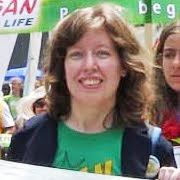 You know that adopting a vegan diet is best for the animals. But do you have to sacrifice your health to do it? Relax.
You know that adopting a vegan diet is best for the animals. But do you have to sacrifice your health to do it? Relax.
When people give up meat they often wonder where they will get their protein, or as one woman asked me, "How do you manage to eat six servings of legumes a day?" In fact, it's hard not to get enough protein. Centring your diet on whole grains, vegetables, and legumes (one or two servings a day) will give you protein to spare. The only ways a vegan could become protein deficient are to not eat enough calories, to eat only fruit, or to eat mostly junk food. (Of course, infants need to be breastfed or given a suitable formula until their digestive system is mature enough to process other foods.)
And forget fancy rules about protein combining, which even the American Dietetic Association acknowledges is unnecessary.
Thanks to the efforts of the Milk Marketing Board, you may think that giving up milk will doom you to osteoporosis. What they won't tell you is that older women in countries that have low milk consumption have less osteoporosis than older women in countries with high milk consumption, like Canada. Why? First of all, calcium is available from many foods besides milk, such as dark green vegetables (except spinach), legumes, nuts, seaweed, and figs. [Since this article was written, calcium-fortified soy drinks and orange juice have become widely available in Canada, making getting enough calcium very easy.] Secondly, a key risk factor for osteoporosis is high protein intake. High as in, eating meat on a regular basis. Excess protein causes calcium to be lost in the urine. Other risk factors are lack of exercise, smoking, soft drinks, and caffeine.
Getting enough vitamin B12 is one worry that may have a grain of truth. This vitamin is made by bacteria, and is abundant in corpses (meat), eggs, and mammary secretions (milk). Where vegans can get it is not so clear. Some vegans have gone for decades with no known source of B12, whereas others have developed a deficiency only a few years after becoming vegan. Since B12 deficiency is serious, play it safe and take a 25 microgram supplement every week. (Look for the words cobalamin or cyanocobalamin on the label.) [Or use a soy drink fortified with vitamin B12.]
Hopefully I've reassured you that veganism won't kill you. Now here's the good news--unless you're living on pop and chips, veganism is healthier!
Many of the most dreaded diseases of our society, including breast cancer, colon cancer, heart disease, non-insulin dependent diabetes, and stroke, are linked with the consumption of animal products. By becoming vegan, you can reduce the risk dramatically.
"Couldn't I just use leaner meats and skim milk?" you ask. That might do some good, but not as much as becoming vegan would. Evidence is mounting that animal protein is also a significant risk factor. In addition, plant foods contain higher levels of antioxidants, substances which protect the body from free-radicals and thus slow down the aging process and the progress of some degenerative diseases. And animal products contain none of the dietary fibre which is so important.
And you don't have to wait decades to see benefits from your vegan diet.
For example, if you've been starving yourself to become fashionably slim, starve no more! Vegans tend to be slimmer than nonvegans, because we eat more carbohydrates, which rev up our metabolisms, and because with few exceptions vegan food is lower in fat. What you eat is more important than how much.
The benefits I have noticed since becoming a vegan four years ago are typical. My cellulite disappeared, my painful ear infections are gone for good, and the mucus that used to clog my throat is a thing of the past. Provided I avoid french fries (my weakness), I have no PMS and no menstrual cramps. And best of all, I have much more energy as a vegan than I did as a meat-eater or lacto-ovo-vegetarian.
So what are you waiting for? Being vegan doesn't just save animals' lives--it can save your life, too!
This article originally appeared in a slightly different form in the February 8, 1996 issue of The Varsity, a student newspaper at the University of Toronto . Reproduced with permission.
